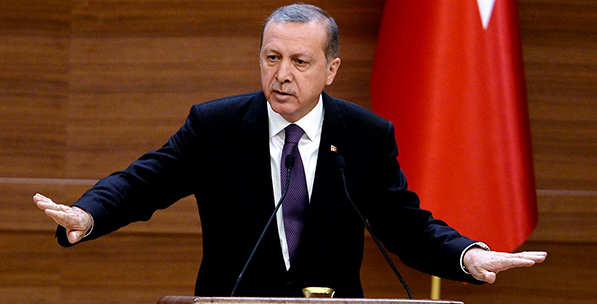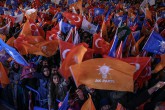It might be a quite saddening but crystal clear truth that democratic values, principles and institutions that claim to be universal do not apply to Western perceptions of political development in Turkey or the Middle East in general.
That is the principal reason why when it comes to interpreting Turkey’s journey to democratic consolidation the natural reflexes of both international reporters and analysts as well as their domestic interlocutors are wrought with cultural prejudice, euro-centrism, ideological discrimination and orientalism. These attitudes are in perfect conformity with the historically dominant narratives and discourses regarding democratization in the Middle East reproduced constantly in accordance with contemporaneous Western strategic interests and/or geopolitical considerations.
Having seen the double standards on democratization in the Middle East since the U.S. invasion of Iraq, performed on the precept of liberating the Iraqi people, but instead put the country into the hands of sectarian warlords and terrorists, there remain very few people who could take Western claims or analyses on democracy seriously. Especially over the course of the reversal of the Arab revolutions, it became clear that the classical Cold War geopolitical mentality based on regional stability and predictability at the expense of democratic representation continued to dominate calculations in Western capitals. Therefore, when social movements longing for democracy and freedom were suppressed violently by military dictators; caught within civil wars among factions in Syria, Libya and Yemen; or heavy-handedly silenced by oppressive monarchies in the Gulf, there were hardly any reactions coming from the self-proclaimed representatives of the free world. Not mentioning the lame duck president who contributed to the increased number of casualties by giving false hopes to the democratic revolutionaries in Egypt, or social forces in Syria trying to break Syrian President Bashar Assad’s hold on state terrorism.
Amid all the violence, terror, civil wars and great power meddling in the Middle East, Turkey has excelled as the most effective and representative national democratic system, led by a popularly elected president. President Recep Tayyip Erdoğan’s strong reaction to Israel after the Mavi Marmara incident and his unwavering support for democratic forces over the course of the reversal of Arab revolutions created unease in Western capitals, but still it was surprising to see how rapidly his image was transformed from the best democratic partner in the Middle East to an isolationist and “repressive dictator” falsely vilified by international media and their domestic allies. Since May 2013, there has been a concerted effort manifested into the escalation of the Gezi Park protests and the attacks by the Gülen Movement through secret cells in the judiciary and security forces to take Erdoğan out of the regional equation. Western governments and international and opposition media outlets implicitly or explicitly supported this effort, and the ambiguous results of the June 7 general elections gave a glimmer of hope to the anti- Erdoğan bloc.Yet it seems that the embedded prejudices, orientalist attitudes and ideological barriers prevented global analysts from grasping the deepness of democratic legitimacy held by Erdoğan and the Justice Development Party (AK Party) he founded. Political instability, failure of opposition parties to adopt a constructive attitude, early signs of economic stagnation as well as the resumption of terror attacks by the PKK in the post-elections period convinced half of the electorate to support democratic stability through the AK Party as the safe actor to take the country into the 2020s.
This was a purely rational and subjective decision by around 49 percent of the electorate – a level of democratic support that most of the Western political parties can only dream of – on the basis of their assessment of Turkey’s current conditions and future aspirations. From now on, Erdoğan and Prime Minister Ahmet Davutoğlu will work in harmony for the construction of “New Turkey” with even stronger motivation and democratic legitimacy, knowing that despite internationally supported manipulations the hearts and minds of the majority of the Turkish electorate are with them. Contrary to biased and pessimistic accounts in the West raising the alarm about the rise of despotism and autocracy in Turkey after the elections, the coming months and years will witness a brighter record for Turkey’s structural reforms in the economy and democratic consolidation efforts in politics. If the global actors could minimize their meddling and disinformation efforts in domestic politics they could contribute to this virtuous process.
[Daily Sabah, November 7, 2015]
In this article
- Foreign Policy
- Opinion
- 2013
- 2015
- Arabian peninsula
- Bashar Al Assad
- Civil War
- Cold War
- Daily Sabah
- Disinformation
- Egypt
- Elections
- Global Actors | Local Actors
- gulf
- Iraq
- Israel
- Istanbul
- Kurdistan Workers' Party Terrorist Organization (PKK)
- Libya
- Libyan Crisis
- May 28-August 20 2013 The Gezi Park Protests
- Middle East
- Opposition
- PKK - YPG - SDF - PYD - YPJ - SDG - HBDH - HPG - KCK - PJAK - TAK - YBŞ
- Prime Minister
- Recep Tayyip Erdoğan
- Syria
- Syrian Civil War
- Syrian Conflict
- Syrian Crisis
- taksim
- Terror
- Terror Attack
- Terrorism
- The President of the Republic of Türkiye
- Turkish President
- Türkiye's Justice and Development Party | AK Party (AK Parti)
- United States (US)
- US Invasion
- US Invasion of Iraq
- Western World
- Yemen


